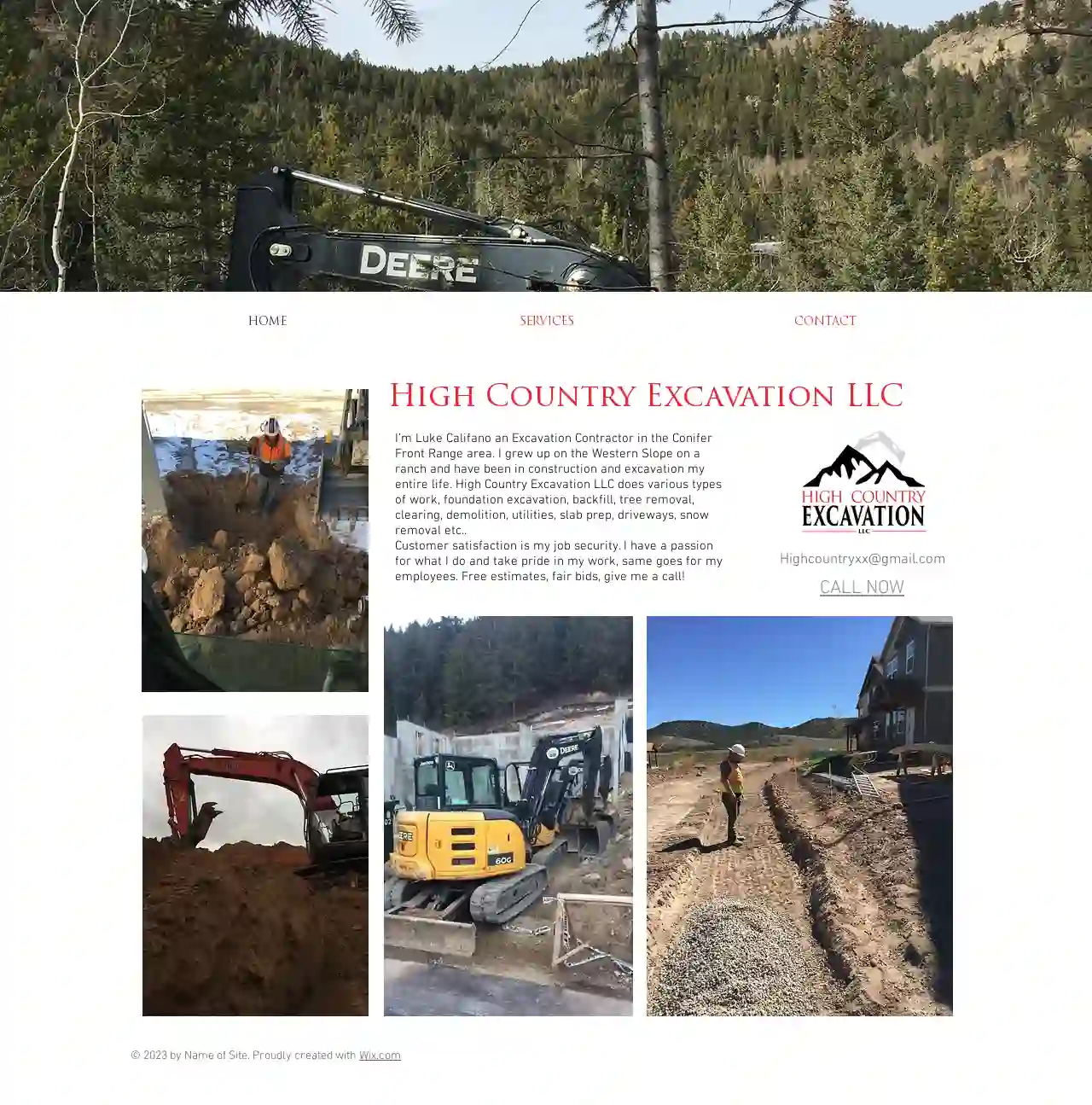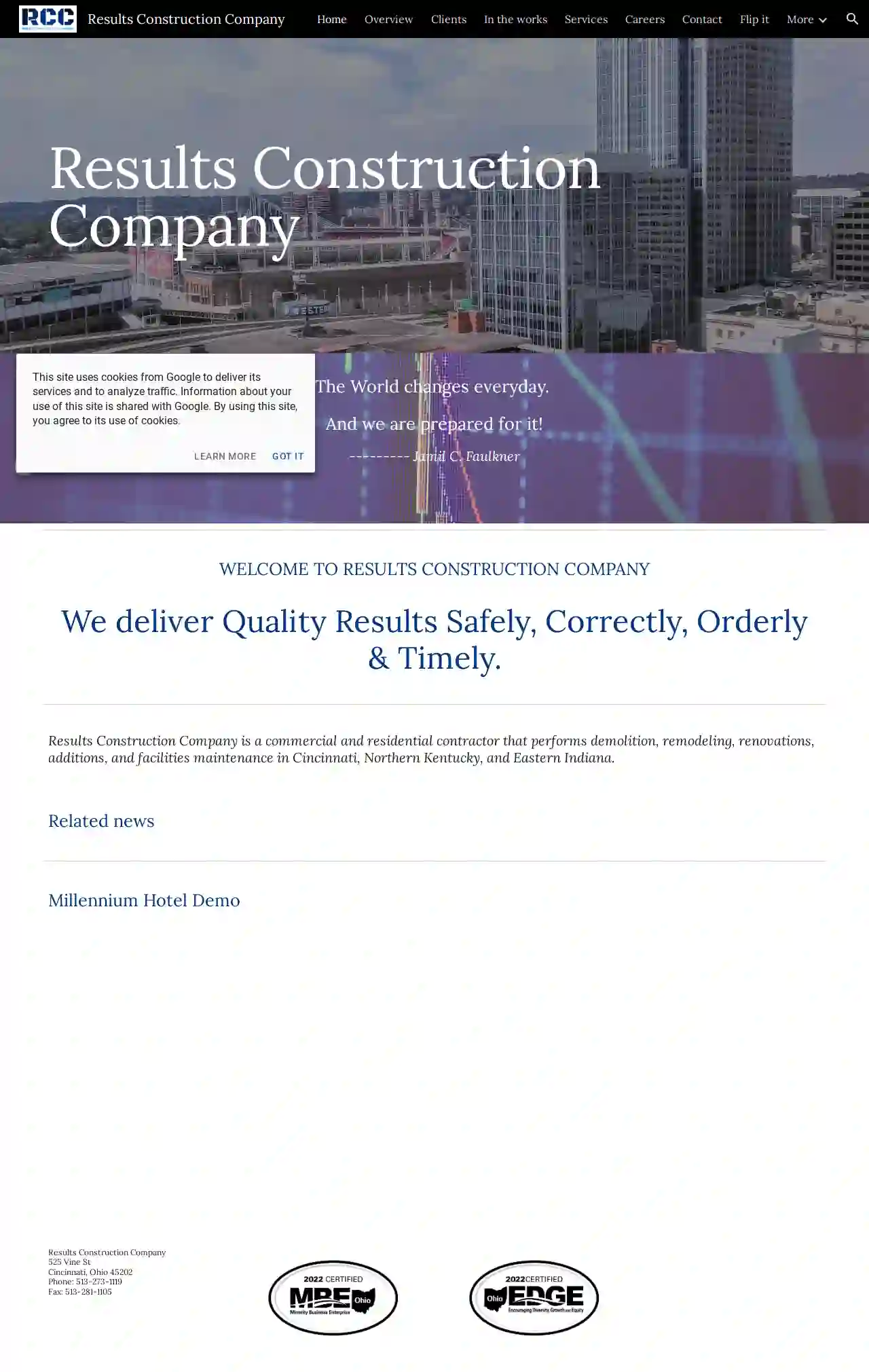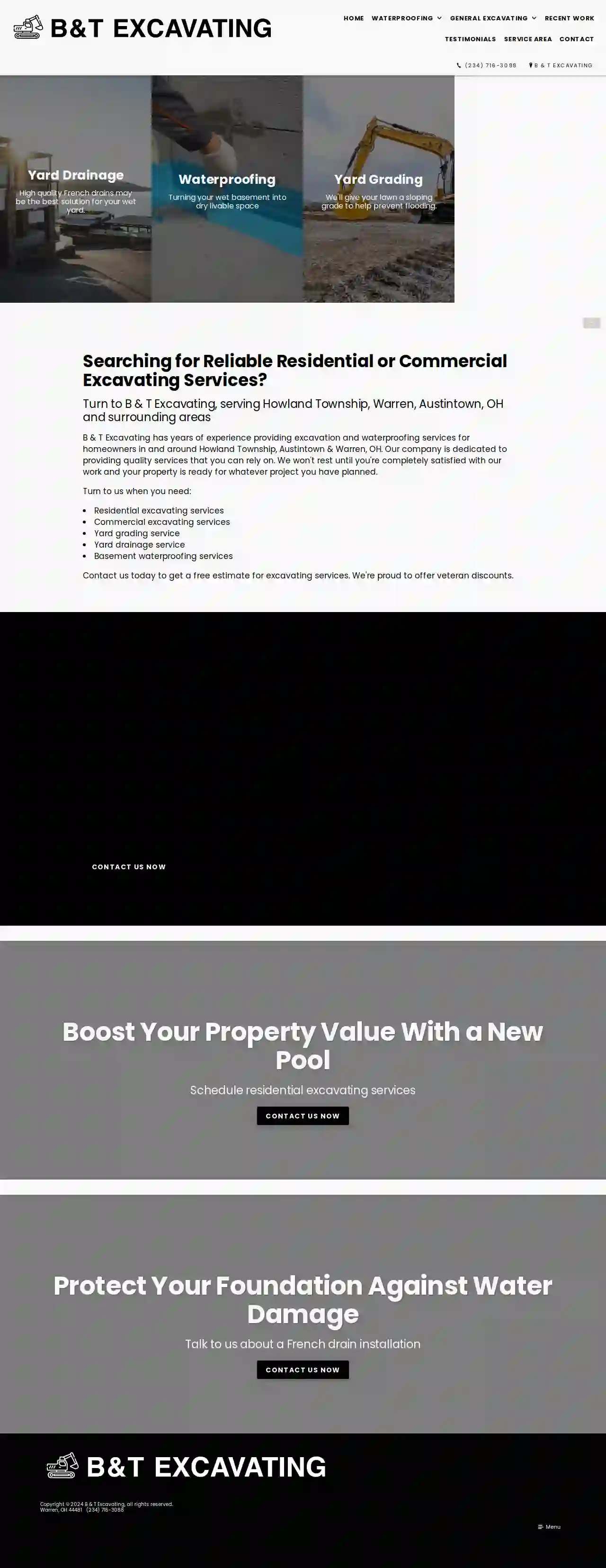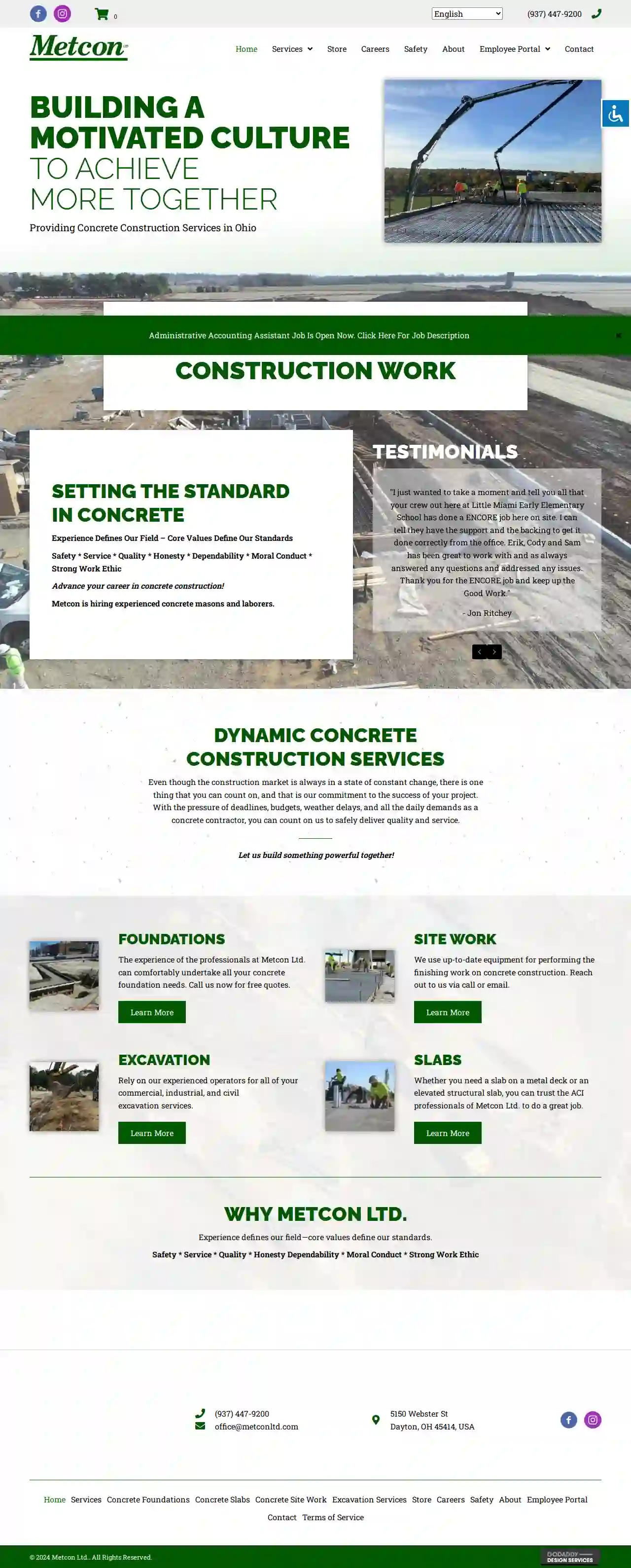Excavation Contractors Wellston
Best Excavation Services in Wellston
Get 3 FREE Excavating Contractors quotes for your project today! Compare profiles, reviews, accreditations, portfolio, etc... and choose the best offer.

Stahlheber Excavating, Inc.
52 reviews4205 Hamilton-Eaton Rd., Hamilton, 45011, USThe Greater Hamilton Chamber: Your Partner in Business Growth We are dedicated to fostering a thriving business environment in the southwest Ohio region. We provide a platform for businesses and nonprofits to connect, collaborate, and flourish. Joining the Greater Hamilton Chamber means gaining access to a supportive network, valuable resources, and opportunities for growth. We understand the challenges businesses face, especially in today's dynamic landscape. That's why we offer a range of services and programs designed to help you succeed. Whether you're seeking to expand your reach, build new connections, or access essential resources, we're here to support you every step of the way. Our commitment to the Hamilton community is unwavering. We work tirelessly to advocate for policies that benefit businesses and create a favorable environment for economic development. We believe in the power of collaboration and are proud to be a catalyst for positive change in our region. Join us today and become part of a vibrant community of businesses and individuals who are passionate about Hamilton's success.
- Services
- Why Us?
- Our Team
- Gallery
Get Quote
Mike Pusateri Excavating
4.85 reviews16363 Saint Clair Avenue, East Liverpool, 43920, USA Family Owned Commercial and Residential Excavating Company Mike Pusateri Excavating Inc is a Commercial and Residential Excavating Company that prides itself in the quality of work and high standards of performance it provides for our customers. These qualities and principles have been the foundation of the company since 1960. We continue to take pride in our work and strive for excellence resulting in top quality projects that reflects the reputation we have built over the years and continue to stand by. The Company was founded by Michael Pusateri Sr. in 1960. It all started with a dump truck and high lift. The company continued to grow due to the hard work and success over the years. Eventually, the reins were turned over to the next generation when Mike Pusateri Jr and brother Jim Pusateri took over the responsibilities. During these years the company began to expand, and their equipment fleet and capabilities grew larger. Mike Pusateri Jr. is still the acting President of the company and now with the addition of a third generation to include sons Matt and Jason Pusateri as well as nephew Adam Pusateri, the company continues to grow maintaining the reputation it was built upon. The fleet now has GPS modeling and machine control capabilities and are continually evolving to provide High Quality Projects.
- Services
- Why Us?
- Our Team
- Gallery
Get Quote
Ferguson Construction
4.110 reviewsP.O. Box 726400, 400 Canal Street, Sidney, 45365, USBUILDING IS COMPLICATED. YOU DESERVE AN EASY BUTTON. We know the challenges and complications of commercial construction. We anticipate them and even embrace them. Our “easy button” approach simplifies the entire process while reducing uncertainty and miscommunication, giving businesses the positive experience they deserve. EXPLORE OUR EASY BUTTON ON APPROACH
- Services
- Why Us?
- Accreditations
- Testimonials
- Gallery
Get Quote
High Country Excavation, LLC
Lakewood, USHigh Country Excavation LLC I’m Luke Califano, an Excavation Contractor in the Conifer Front Range area. I grew up on the Western Slope on a ranch and have been in construction and excavation my entire life. High Country Excavation LLC does various types of work, including foundation excavation, backfill, tree removal, clearing, demolition, utilities, slab prep, driveways, snow removal, and more. Customer satisfaction is my job security. I have a passion for what I do and take pride in my work, and the same goes for my employees. I offer free estimates and fair bids. Give me a call!
- Services
- Why Us?
- Gallery
Get Quote
Results Construction Company
4.68 reviews525 Vine St, Cincinnati, 45202, USThe World changes everyday. And we are prepared for it! Jamil C. Faulkner WELCOME TO RESULTS CONSTRUCTION COMPANY We deliver Quality Results Safely, Correctly, Orderly & Timely. Results Construction Company is a commercial and residential contractor that performs demolition, remodeling, renovations, additions, and facilities maintenance in Cincinnati, Northern Kentucky, and Eastern Indiana.
- Services
- Why Us?
- Gallery
Get Quote
Warbucks Land Clearing & Excavating
4.450 reviews123 Main Street, Anytown, 12345, USWarbucks Excavation: Your Trusted Partner for Excavation Services Warbucks Excavation is a family-owned and operated business with over 20 years of experience in the excavation industry. We are committed to providing our clients with high-quality, reliable, and affordable excavation services. We have a team of experienced and skilled operators who are dedicated to getting the job done right, on time, and within budget. We understand that excavation projects can be complex and challenging. That's why we take a personalized approach to every project, working closely with our clients to ensure that their needs are met. We are also committed to safety and environmental responsibility, and we always strive to minimize our impact on the environment. Whether you need site preparation, foundation excavation, utility installation, or any other excavation services, Warbucks Excavation is the company to call. We are confident that you will be satisfied with our work.
- Services
- Why Us?
- Testimonials
Get Quote
B & T Excavating
4.823 reviewsWarren, 44481, USB & T Excavating: Your Trusted Excavation Partner in Howland Township, Warren, and Austintown, OH B & T Excavating is a seasoned excavation company serving Howland Township, Warren, Austintown, and surrounding areas in Ohio. We've built a reputation for delivering high-quality excavation and waterproofing services that homeowners can rely on. Our commitment to customer satisfaction is unwavering. We won't rest until you're completely happy with our work and your property is ready for your next project. We understand that choosing the right excavation contractor is crucial for your project's success. That's why we offer a comprehensive range of services, including: Residential and Commercial Excavating Services Yard Grading Services Yard Drainage Services Basement Waterproofing Services Land Clearing Services Our team is equipped with the expertise and modern equipment to handle any excavation project, from preparing your property for new construction to installing septic systems, ponds, and pools. We're also dedicated to providing exceptional customer service and transparent communication throughout the entire process. Contact us today for a free estimate and discover how B & T Excavating can help you achieve your property goals.
- Services
- Why Us?
- Gallery
Get Quote
Foltz's Construction Services LLC
522 reviewsNorth Lima, OH, 44452, USTrust Foltz’s Construction Services With all of your water drainage needs Team Up With a Local Excavating Contractor for Mahoning County, Columbiana county and western Pennsylvania Our Family-owned Local Excavating Company is Dedicated to Developing Lasting Relationships With Our Clients. To do that, our excavating contractors will always: Treat your property with respect Arrive to work on time Be available to talk 24/7 Work with customer to develop a comprehensive plan Address all concerns and questions. With services this customizable, you have nothing to worry about. Call us today for a free, no strings attached estimate. We'll tell you how we can help by offering Exterior Waterproofing Services, French Drains, Culvert Pipe Installation, Surface Drains, Downspout Installation, Snow Removal, Excavation Services, Gravel Driveway Installation and/or Resurfacing, or Demolition Services. Even a small amount of water damage can lead to structural issues and costly repairs. Look to us as a waterproofing contractor when you need to protect your property from water buildup and flooding. If waterproofing isn't for you, you may benefit from a variety of different drain installations instead such as french drains, culvert pipes, surface drains, downspout replacements etc.No matter what option is right for you, you can depend on our experienced team to get it done. Our local excavating company is dedicated to giving you the best customer service in the industry. When you partner with us, you're in good hands. Let Us stop water from pooling on Your Property If you need excavation services in Mahoning, Columbiana and Western Pennsylvania, turn to the local pros at Foltz's Construction Services. Our excavating contractors have over four decades of experience
- Services
- Why Us?
- Testimonials
- Gallery
Get Quote
Newton's Outdoor Services
55 reviews778 W Richard Dr, Xenia, 45385, USYour friend with a tractor Your choice for landscaping and excavation in Xenia, Ohio and surrounding areas! We're here to do what you need, when you need it. Contact us today to find out how we can help you get the results you want. Get to know us! Newton's Outdoor Services is owned and run by Brandon Newton of Xenia, Ohio with support from his wife Jessica and son Clayton. Passion for operating equipment came at a young age where he learned to drive tractors and work around the farm. A graduate of Bethel High School. In high school he attended the Miami Valley Career Technology Center where he completed the Ag Resources Management program. While also participating in FFA and 4-H and showing livestock at the local fair. Since then he has worked at Copey's Butcher Shop as a Butcher for 9 years before deciding to start his business in the Landscaping and Excavation industry. In his free time Brandon enjoys being in the great outdoors hunting, fishing, and spending time with family. He loves to meet new customers and provide friendly and quality services. Be sure to reach out if there is anything we can help you with!
- Services
- Why Us?
- Gallery
Get Quote
Metcon Ltd
3.920 reviews5150 Webster St, Dayton, 45414, USBuilding a Motivated Culture To Achieve More Together Providing Concrete Construction Services in Ohio The Reliable Experts in Construction Work Setting the Standard in Concrete Experience Defines Our Field – Core Values Define Our Standards Safety Service Quality Honesty Dependability Moral Conduct Strong Work Ethic Advance your career in concrete construction! Metcon is hiring experienced concrete masons and laborers. Testimonials "I just wanted to take a moment and tell you all that your crew out here at Little Miami Early Elementary School has done a ENCORE job here on site. I can tell they have the support and the backing to get it done correctly from the office. Erik, Cody and Sam has been great to work with and as always answered any questions and addressed any issues. Thank you for the ENCORE job and keep up the Good Work." - Jon Ritchey "Some of the hardest working people out there, coupled with excellent coordination and execution. Metcon Ltd. knows how to get the job done right and done fast!" - Matt Salle Dynamic Concrete Construction Services Even though the construction market is always in a state of constant change, there is one thing that you can count on, and that is our commitment to the success of your project. With the pressure of deadlines, budgets, weather delays, and all the daily demands as a concrete contractor, you can count on us to safely deliver quality and service. Let us build something powerful together!
- Services
- Why Us?
- Testimonials
- Gallery
Get Quote
Over 22,076+ Excavation Contractors registered
Our excavation providers operate in Wellston & surrounding areas!
ExcavationHQ has curated and vetted the Best Excavation Businesses near Wellston. Find a reliable business today.
Frequently Asked Questions About Excavation Contractors
- Clear the Area: Remove any obstacles, including vehicles, outdoor furniture, landscaping features, or structures, from the excavation zone and surrounding area.
- Mark Existing Features: Identify and mark underground utilities, septic tanks, sprinkler systems, or other buried elements you want to protect.
- Protect Landscaping: Use tarps or fencing to shield trees, shrubs, gardens, or other landscaping elements from damage.
- Provide Access: Ensure the excavation contractor has clear access to the work area, including gates wide enough for equipment.
- Discuss Logistics: Coordinate with the contractor regarding parking arrangements, material delivery, and any special instructions or concerns you might have.
- Clearly Define the Scope: Outline the project's goals, including the excavation area, depth, grade, and intended use.
- Obtain Necessary Permits: Research and acquire any required permits from your local authorities.
- Mark Utility Lines: Contact your utility companies to locate and mark underground utilities to prevent damage.
- Communicate with Neighbors: Inform your neighbors about the project's timeline and potential noise or disruptions.
- Prepare the Site: Clear any obstacles, such as vegetation, furniture, or structures, from the excavation area.
- Discuss Safety Protocols: Review safety procedures with the contractor to ensure a safe work environment.
- Determine the Area: Measure the length and width of the area you want to fill. Multiply them to get the area in square feet (or meters).
- Determine the Depth: Measure the difference between the existing grade and the desired grade (how much you need to raise the ground). This is the depth of fill required.
- Calculate Volume: Multiply the area (step 1) by the depth (step 2) to get the volume in cubic feet (or meters).
- Account for Compaction: Fill dirt compacts when it settles, so add 10% to 25% to the calculated volume to account for compaction. The exact percentage depends on the type of fill material.
- Utility Locates: Contact your utility companies to mark the locations of underground lines before excavation begins. This is usually a free service.
- Hand Digging: Excavate carefully by hand near marked utility lines to avoid damage.
- Potholing: Digging small test holes to expose and verify utility depths and locations.
- Safe Distances: Maintaining a safe distance between excavation equipment and marked utility lines.
- Vacuum Excavation: Using vacuum excavation techniques to expose utilities without digging, reducing the risk of damage.
How do I prepare my property for excavation?
What should I do before excavation starts?
How do I calculate how much dirt I need for fill?
How do you protect utilities during excavation?
How do I prepare my property for excavation?
- Clear the Area: Remove any obstacles, including vehicles, outdoor furniture, landscaping features, or structures, from the excavation zone and surrounding area.
- Mark Existing Features: Identify and mark underground utilities, septic tanks, sprinkler systems, or other buried elements you want to protect.
- Protect Landscaping: Use tarps or fencing to shield trees, shrubs, gardens, or other landscaping elements from damage.
- Provide Access: Ensure the excavation contractor has clear access to the work area, including gates wide enough for equipment.
- Discuss Logistics: Coordinate with the contractor regarding parking arrangements, material delivery, and any special instructions or concerns you might have.
What should I do before excavation starts?
- Clearly Define the Scope: Outline the project's goals, including the excavation area, depth, grade, and intended use.
- Obtain Necessary Permits: Research and acquire any required permits from your local authorities.
- Mark Utility Lines: Contact your utility companies to locate and mark underground utilities to prevent damage.
- Communicate with Neighbors: Inform your neighbors about the project's timeline and potential noise or disruptions.
- Prepare the Site: Clear any obstacles, such as vegetation, furniture, or structures, from the excavation area.
- Discuss Safety Protocols: Review safety procedures with the contractor to ensure a safe work environment.
How do I calculate how much dirt I need for fill?
- Determine the Area: Measure the length and width of the area you want to fill. Multiply them to get the area in square feet (or meters).
- Determine the Depth: Measure the difference between the existing grade and the desired grade (how much you need to raise the ground). This is the depth of fill required.
- Calculate Volume: Multiply the area (step 1) by the depth (step 2) to get the volume in cubic feet (or meters).
- Account for Compaction: Fill dirt compacts when it settles, so add 10% to 25% to the calculated volume to account for compaction. The exact percentage depends on the type of fill material.
How do you protect utilities during excavation?
- Utility Locates: Contact your utility companies to mark the locations of underground lines before excavation begins. This is usually a free service.
- Hand Digging: Excavate carefully by hand near marked utility lines to avoid damage.
- Potholing: Digging small test holes to expose and verify utility depths and locations.
- Safe Distances: Maintaining a safe distance between excavation equipment and marked utility lines.
- Vacuum Excavation: Using vacuum excavation techniques to expose utilities without digging, reducing the risk of damage.